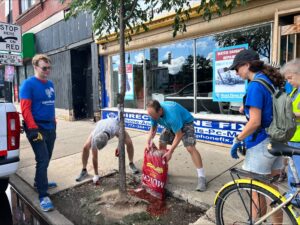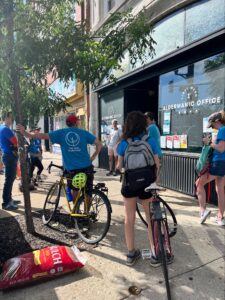It was a simple ask. Our Chicago First Ward Alderman, Daniel La Spata, included a notice in his e-newsletter about a Saturday morning outing, organizing at his ward office on Milwaukee Avenue, for volunteers to join Openlands Chicago tree keepers to help place mulch around street trees nearby on Armitage and Milwaukee Avenues, and just, well, clean up a bit.
I admit to being an easy sell on urban trees. There is a beautiful century-old American elm in our backyard. Nearly fifteen years ago, I led an American Planning Association project, funded by the U.S. Forest Service, that resulted in a report called Planning the Urban Forest. It’s not that I believe the right trees in the right places improve the livability of our neighborhoods; I know it because of extensive research over many years that I have digested from numerous sources that prove it. I have written about it in published articles.

Volunteers in front of Ald. La Spata’s office, Saturday, July 29, 2023. All photos provided by Huan Song of Openlands.
So, once in a while, I try to put my muscle and time where my mouth is and just get out and do the real thing. All I had to do was register online so that Openlands knew how many people would participate. Besides, working to improve the survivability of real trees in a street-side environment is always an opportunity to learn something. Add my proclivity as a compulsive extrovert, loving the chance to meet and talk to new people, and I was sold. La Spata seemed pleasantly surprised when I showed up just before 9 a.m., but he shouldn’t have been. This is fun stuff for me.
But first, a word about Openlands, the organization with which he allied to provide this volunteer service opportunity. Openlands is now entering its seventh decade as a regional conservation organization, having been launched in 1963. They have consistently offered a regional vision for a landscape of land and water trails, urban forests, and public gardens, all with an eye to enhancing access for city residents. Together with the Morton Arboretum, based in Lisle, Illinois, they have provided a strong voice for the value of open space and trees in the metropolitan area that have kept people aware of the opportunities for a healthier and more biodiverse environment. While I have not been directly involved in Openlands, I have served for several years on an advisory board for Morton Arboretum’s Chicago Regional Trees Initiative, which has produced model ordinances and programs for communities throughout the region. I highly recommend visiting either or both websites and learning more about their programs in this time when climate change is threatening our urban quality of life.
But back to the scene of the volunteer work. More than a dozen volunteers, many of them certified Tree Keepers for Openlands, showed up. We initially were briefed on the day’s activities, including the areas where we would be working. We would not be planting trees—that is up to the city when it comes to street trees. Nor would we be pruning, which must be done by professional arborists. But we would be working with someone from the Chicago Streets and Sanitation Department, which provided a city truck to pick up any debris we picked up, or garbage, such as empty mulch bags, that the operation generated. Mostly, we used mulch to fill in boxes around street trees, not overloading the site but enough to protect the trees.
 We also dug up and removed some burlap bags that contractors had left around some street trees, in order to allow them to grow and breathe better. That was not always easy because they become buried in the compacted soil, making them hard to extract and remove. Aside from personal fitness, I sometimes wondered what other benefits came from my twice-weekly strength and cardio workouts at a local gym. Now, I realized I was well trained to provide the powerful yank that some of these bags needed to pull them out of muddy soil for disposal. Fitness can serve practical purposes.
We also dug up and removed some burlap bags that contractors had left around some street trees, in order to allow them to grow and breathe better. That was not always easy because they become buried in the compacted soil, making them hard to extract and remove. Aside from personal fitness, I sometimes wondered what other benefits came from my twice-weekly strength and cardio workouts at a local gym. Now, I realized I was well trained to provide the powerful yank that some of these bags needed to pull them out of muddy soil for disposal. Fitness can serve practical purposes.
We were also fortunate that the weather was perfect for the occasion. The high temperature was in the low to mid 70s that day, so the only time I sweated a bit was when, on one occasion, I had to labor extra hard to remove one of those burlap bags. It was sunny but bearable. I had forgotten my sunglasses, but really did not need them.
Toward the end, as our crew had worked its way northwest on one side of Milwaukee Avenue and then back down the other toward the ward office, we were adding mulch in front of a relatively new nonprofit used bookstore, Open Books. If there is one diversion that can get my attention in addition to trees, it is browsing a bookstore, where some trees find a new but lasting use. I also needed to use the bathroom, so I asked the clerk at the checkout desk. On the way back, I mentioned that, on her birthday a few days earlier, my wife and I saw Oppenheimer at a movie theater before getting dinner nearby. Did the store have copies of American Prometheus, the Kai Bird book that inspired the movie? She looked, and they did, and I walked out with a used copy for a little over $13. Combining that with improving the neighborhood environment made for a successful morning, I felt.
 But soon, as noon approached, we had a debriefing on what we had accomplished and any useful suggestions from volunteers. I suggested making wire cutters available because we had encountered chicken wire in some of the tree boxes, something much more problematic than burlap boxes, which eventually biodegrade. I don’t recall what else was mentioned, but our crew leader took notes.
But soon, as noon approached, we had a debriefing on what we had accomplished and any useful suggestions from volunteers. I suggested making wire cutters available because we had encountered chicken wire in some of the tree boxes, something much more problematic than burlap boxes, which eventually biodegrade. I don’t recall what else was mentioned, but our crew leader took notes.
Next to the aldermanic office was an outlet for Jersey Mike’s. I had joked that we should all walk in and tell them we had heard that they were planning to feed the volunteers. We laughed but obviously did no such thing. But the thought of a good sandwich burrowed into my brain, and with less than half a mile to walk home, I entered the store and ordered a turkey sandwich, Mike’s way, and took my prize home for lunch, accompanied by Cheetos and a chocolate chip cookie. The sandwich was the only likely source of nutrition, I suspect, but along with some lemonade from the refrigerator, it felt like an adequate reward for making a small difference in a big city.
Jim Schwab